
PALAEONTOGRAPHICA ABTEILUNG A-PALAOZOOLOGIE-STRATIGRAPHIE
metrics 2024
Illuminating the Fossil Record: A Hub for Scholarly Exchange
Introduction
Palaeontographica Abteilung A-Palaozoologie-Stratigraphie is a prominent academic journal that serves as a vital resource for researchers in the fields of Paleontology and Stratigraphy. Published by E Schweizerbart'sche Verlagsbuchhandlung in Germany, this journal has been instrumental in disseminating cutting-edge research from 1996 to 2024. With an established reputation highlighted by its Q3 ranking in both Paleontology and Stratigraphy, it ranks 26th among 113 journals in Paleontology and 15th among 55 in Stratigraphy, showcasing its significance within the scientific community. Although it does not currently offer open access, the journal provides an invaluable platform for the exchange of innovative ideas and findings in paleobiological and stratigraphic studies. As such, Palaeontographica continues to attract contributions from leading academics, making it an indispensable publication for professionals and students alike who are eager to advance their understanding of Earth's historical biological and geological patterns.
Metrics 2024
 0.26
0.26 1.80
1.80 1.80
1.80 41
41Metrics History
Rank 2024
Scopus
IF (Web Of Science)
JCI (Web Of Science)
Quartile History
Similar Journals

STRATIGRAPHY AND GEOLOGICAL CORRELATION
Innovating the Science of Stratigraphy and CorrelationSTRATIGRAPHY AND GEOLOGICAL CORRELATION is a prominent scholarly journal published by PLEIADES PUBLISHING INC, featuring a dedicated focus on the fields of geology, stratigraphy, and paleontology. With ISSN 0869-5938 and E-ISSN 1555-6263, this journal has been disseminating significant research findings since its inception in 1994, continuously contributing to the academic discourse through 2024. Despite not currently offering open access, its relevance is underscored by its Category Quartiles for 2023, where it has established itself as Q3 in Geology and Paleontology, and Q2 in Stratigraphy. STRATIGRAPHY AND GEOLOGICAL CORRELATION ranks #29 out of 55 in Stratigraphy and #186 out of 321 in Geology according to Scopus metrics, positioning it within the competitive landscape of Earth and Planetary Sciences. Researchers, professionals, and students are invited to engage with the journal’s content to deepen their understanding and foster innovation within these critical areas of study.
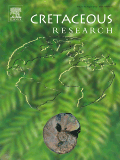
CRETACEOUS RESEARCH
Delving Deep into Earth's Ancient PastCRETACEOUS RESEARCH, published by Academic Press Ltd - Elsevier Science Ltd, is a leading journal in the field of Paleontology that has established itself as an essential resource for researchers and professionals delving into the rich tapestry of the Cretaceous period. With its ISSN 0195-6671 and E-ISSN 1095-998X, this journal boasts a prestigious placement in the academic landscape, holding a Q1 rank in the 2023 Paleontology category and proudly positioned at 21st out of 113 in the Scopus ranking, reflecting its impact factor that places it in the 81st percentile. Since its inception in 1980, CRETACEOUS RESEARCH has facilitated a deeper understanding of prehistoric life and its evolutionary processes, covering topics such as fossil discoveries, paleoecology, and biostratigraphy. This journal best serves those seeking to expand their knowledge and contribute innovative findings to the scientific discourse surrounding the Cretaceous era. As it continues to converge into the future until 2025, it remains dedicated to providing an open platform for the dissemination of high-quality research that shapes our understanding of Earth’s geological past.

RIVISTA ITALIANA DI PALEONTOLOGIA E STRATIGRAFIA
Bridging Disciplines in the Study of Earth’s LayersRIVISTA ITALIANA DI PALEONTOLOGIA E STRATIGRAFIA, published by Università degli Studi di Milano, is a leading open access journal dedicated to the fields of Paleontology, Geology, and Stratigraphy. Established in 1979, this prestigious journal fosters the dissemination of high-quality research and innovative studies within these disciplines, holding a commendable Q2 ranking in Geology, Paleontology, and Stratigraphy as of 2023. The journal’s commitment to accessibility since 2016 underlines its objective to promote the sharing of knowledge among researchers, professionals, and students alike. With its notable Scopus rankings reflecting a solid performance in the Earth and Planetary Sciences, particularly in Paleontology and Stratigraphy, RIVISTA ITALIANA serves as a vital resource for those seeking to stay informed on the latest advancements and discoveries within the geological sciences. For further inquiries, the editorial office is located at C/O RIVISTA ITALIANA PALEONTOLOGIA STRATIGRAFIA, VIA MANGIAGALLI, 34, 20133 MILANO, ITALY.

PalZ
Discovering the Dynamics of Extinct EcosystemsPalZ is a prestigious academic journal in the field of Paleontology, published by Springer Heidelberg in Germany. With a long-standing history that traces back to its converged years from 1914 to 2024, this journal offers invaluable insights into the evolutionary dynamics and ecological relationships of past life forms. Holding a commendable impact factor and ranked in the Q2 category of Paleontology, it consistently showcases high-quality research that resonates within the scientific community, evidenced by its Scopus rank of #38 out of 113 in Earth and Planetary Sciences. PalZ is committed to open access, ensuring that its rich repository of scholarly articles is readily accessible for researchers, professionals, and students alike. By engaging with the journal, readers will encounter cutting-edge studies that are pivotal for advancing our understanding of paleobiology and the historical patterns of biodiversity.
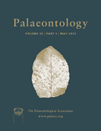
PALAEONTOLOGY
Exploring Fossilized Legacies for a Deeper TomorrowPALAEONTOLOGY, published by Wiley in the United Kingdom, is a leading journal dedicated to advancing the knowledge of Earth's biological history through the study of fossilized remains. With an ISSN of 0031-0239 and an E-ISSN of 1475-4983, this journal has established itself as a premier resource in the field, boasting a remarkable Q1 ranking in both Paleontology and Ecology, Evolution, Behavior and Systematics according to the 2023 category quartiles. Its commitment to high-quality research is evidenced by its Scopus rankings, placing it in the 93rd percentile among paleontology journals. While PALAEONTOLOGY is not currently open access, its extensive archival reach from 1979 to 2024 ensures that vital research findings remain accessible to the academic community. This journal not only acts as a platform for cutting-edge research but also fosters collaboration among scientists, students, and professionals interested in the implications of paleontological studies on contemporary ecological and evolutionary issues.
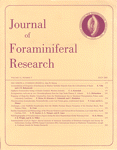
JOURNAL OF FORAMINIFERAL RESEARCH
Unveiling the Mysteries of Foraminifera and Their EnvironmentsJOURNAL OF FORAMINIFERAL RESEARCH is a premier academic journal published by the Cushman Foundation for Foraminiferal Research, dedicated to advancing the field of foraminiferal studies within the broader disciplines of paleontology and microbiology. Established in 1979, this journal has been a vital publication for researchers aiming to explore the intricate relationships between foraminifera and their environments, contributing to a deeper understanding of earth's history. With a Q4 ranking in Microbiology and a Q3 ranking in Paleontology as of 2023, it plays an essential role in shaping scholarly discourse in these areas. Although it currently does not offer open access, the journal remains a valuable resource for scientists, professionals, and graduate students eager to engage with contemporary research findings and methodologies. The subtle interconnections between foraminiferal research and broader ecological implications underscore the journal's commitment to fostering academic inquiry, making it an indispensable ally for those invested in the ongoing scientific exploration of our planet.
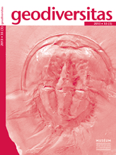
GEODIVERSITAS
Bridging the Past and Present in Earth SciencesGEODIVERSITAS, an esteemed journal published by the Museum National d'Histoire Naturelle, represents a significant contribution to the fields of geology and paleontology. With an ISSN of 1280-9659, this peer-reviewed publication has established itself as a vital resource for researchers, professionals, and students alike, disseminating high-quality and innovative research since its inception in 2002. Covering a broad spectrum of topics within earth sciences, GEODIVERSITAS not only showcases cutting-edge studies but also fosters a deeper understanding of geological and paleontological phenomena. Ranked in the Q2 category of both geology and paleontology for 2023, the journal exemplifies rigorous scholarly standards and makes significant strides in enhancing knowledge within these disciplines. With its headquarters in Paris and a commitment to scientific excellence, GEODIVERSITAS stands as a leading voice in contemporary earth science research, inviting contributions that drive forward the conversation in geology and paleontology.
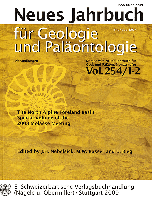
NEUES JAHRBUCH FUR GEOLOGIE UND PALAONTOLOGIE-ABHANDLUNGEN
Pioneering Research in Earth SciencesNEUES JAHRBUCH FUR GEOLOGIE UND PALAONTOLOGIE-ABHANDLUNGEN, published by E SCHWEIZERBARTSCHE VERLAGSBUCHHANDLUNG, is a distinguished scholarly journal based in Germany that has made significant contributions to the field of Earth and Planetary Sciences with a particular emphasis on Paleontology. With its ISSN: 0077-7749, this journal provides an essential platform for researchers, professionals, and students to explore cutting-edge research and developments that enhance our understanding of geological and paleontological processes. Boasting a robust ranking of #67 out of 113 in Scopus for the category of Earth and Planetary Sciences and achieving a Q3 quartile ranking in Paleontology, it stands as a significant resource in the global academic community. Though not an open-access journal, it offers valuable insights from 1987 onwards, ensuring a comprehensive archive of high-quality research articles published from 1995 to 2024. Its scholarly impact continues to resonate, making it a vital reference point for advancements in the ever-evolving disciplines of geology and paleontology.
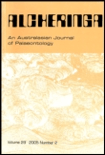
ALCHERINGA
Illuminating the Path of Scientific DiscoveryALCHERINGA, published by Taylor & Francis Ltd, is a distinguished academic journal that has been at the forefront of research in the fields of ecology, evolution, behavior, systematics, and paleontology since its inception in 1975. With an ISSN of 0311-5518 and E-ISSN 1752-0754, this journal serves as a critical platform for the dissemination of high-quality research, contributing significantly to the understanding of biological and geological sciences. Ranking in the Q3 quartile for both Ecology, Evolution, Behavior and Systematics, as well as Paleontology, ALCHERINGA is well-positioned within the academic community, attracting submissions from researchers across the globe. The journal's Scopus ranks further highlight its relevance, particularly its position in the 51st percentile for Ecology and the 50th percentile for Paleontology. Although it does not operate under an open access model, ALCHERINGA remains committed to providing valuable insights and fostering discussions that are essential for the advancement of these vital scientific disciplines. Researchers, professionals, and students are encouraged to explore the profound implications of the studies published within, making it an indispensable resource for anyone aiming to deepen their expertise in these fields.
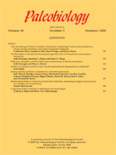
PALEOBIOLOGY
Pioneering Research in the Evolution of LifePALEOBIOLOGY, published by Cambridge University Press, is a premier, peer-reviewed journal that stands at the forefront of research in paleontological sciences. With a robust commitment to advancing the study of the interactions between ancient life forms and their environments, the journal has established itself as a vital resource for researchers, professionals, and students in the fields of paleontology, ecology, and evolutionary biology. Spanning from 1975 to 2024, it boasts an impressive Q1 ranking in several categories, including Agricultural and Biological Sciences, Ecology, and Paleontology, indicative of its high impact and relevance in shaping contemporary scientific discourse. While the journal is not open access, it offers a variety of subscription and access options, ensuring broad distribution and visibility of published research. As a leader in its discipline, PALEOBIOLOGY aims to facilitate a deeper understanding of our planet's biological history, making it an essential publication for anyone interested in the dynamics of life across geological time.